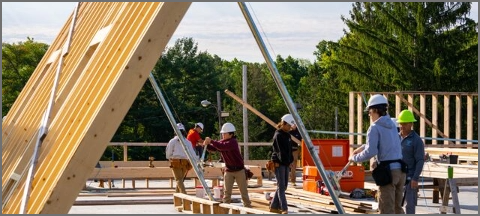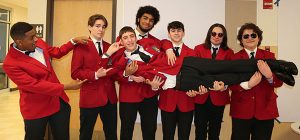The Boston Globe (https://www.bostonglobe.com/2023/01/27/metro/keys-success/) · by Nancy Shohet West
Three years ago, Alan Mack was struggling to make ends meet as a laborer with the state Department of Recreation & Conservation when he was struck in the back by a bullet and left paralyzed. What followed was not only rigorous recuperation, but also a long stretch of being unemployed and homeless.
Relief came in small doses, as a social service agency helped him find a subsidized accessible apartment in Quincy, and the state reconfigured his job to accommodate his disability. But for a person in a wheelchair, the daily commute he had previously made by public transportation was nearly untenable: Typically an hour in duration and requiring several transfers from train to bus, not to mention relying on a system not known for its reliability even in the best of times.
Fortunately, the social service organization that was helping Mack with his numerous challenges had one more idea for him: applying for a vehicle through Concord-based Second Chance Cars, which provides automobiles to low-income recipients who can demonstrate that owning a car would substantively help them to get a job, keep a current job, or advance within their field.

Now Mack makes the 15-minute commute from home to work in his specially equipped car, which he said also will enable him to advance the music production business he recently started after entering an online bachelor’s degree program at Berklee College of Music.
“Having my own vehicle will allow me to expand this business by giving me a way to transport equipment to and from gigs or to travel to shows where I may be paid to perform,” he said.
Mack is one of about 70 beneficiaries to receive vehicles from Second Chance Cars, founded in 2019 by Concord resident Dan Holin. An Israeli-American citizen who served in the Israeli military and then pursued a career in nonprofit administration, Holin was motivated by several intersecting passions, including social outreach, cars, and entrepreneurship. He envisioned a nonprofit that would serve veterans and former prison inmates returning to society. His mission has since expanded to reach others, including legal immigrants and struggling families.

Mentored by leaders of other nonprofits, Holin designed a business model whereby his organization provides donated cars to low-income workers for $900, paid for by the recipients in monthly installments of $75 over the course of a year.
After talking with nearly 20 banks, Holin found two — City of Boston Credit Union and Metro Credit Union — willing to partner with Second Chance Cars by providing zero-interest loans along with free financial counseling to the recipients, with Holin serving as the guarantor. At the end of 12 months, the recipients have not only paid off the loans but also have improved their credit ratings.
Stephanie Tetreault is the kind of person Holin envisioned helping. After battling a drug addiction and serving nearly 10 months in prison for larceny, she was determined to get her life back on track.
Formerly living on the streets, by the fall of 2020 she had housing in Lowell and steady employment as a shift leader at Dunkin’, where she wanted to apply to be a manager. But that job required reliable transportation, and a car was something Tetreault had neither the cash nor the credit rating to obtain.
Her case manager at Thrive Communities, which helps formerly incarcerated people transition back into society, told her about Holin’s organization.
“I went through the application process and met with the board of directors of Second Chance Cars to tell them about my situation,” recalled Tetreault, whose car was prepped at Greater Lawrence Technical School in Andover. “The whole process took just a few weeks, and then I had my car: a 2005 Toyota Prius. It’s been a blessing and a lifesaver.”
Just as Tetreault hoped, Dunkin’ promoted her to a manager position, which she held for about 18 months. Empowered by her newfound independence, her ambitions grew.
“Because I had a car, I felt that I could pursue my larger goal of becoming an addiction counselor,” Tetreault said. “I found a job in that field in May of 2022, and then enrolled in the addiction counseling certificate program at Middlesex Community College.”
The benefits that Second Chance Cars provides reach more than just its recipients. The organization collaborates with five vocational high schools in Massachusetts — Essex Tech in Danvers, Greater Lawrence, Greater Lowell Technical in Tyngsborough, Minuteman High in Lexington, and Northeast Metropolitan Regional Vocational High in Wakefield — enlisting their automotive technology departments to fix any problems the donated cars might have before they are passed on to new owners.
“This is a great match for our program,” said Jill Sawyer, director of Career, Technical and Agricultural Education at Essex Tech — more fully, Essex North Shore Agricultural & Technical School —whose automotive technology students worked on Mack’s car.
“Many of the cars our students work on belong to faculty members or people from the community who understandably need their vehicle repaired as quickly as possible. With Second Chance Cars, we usually have a few weeks with a car, which gives the instructors more time to make it a learning experience. And then the students get to attend the reveal ceremony and learn about the person who is receiving the car, which is eye-opening for them.”
“It’s a win-win situation,” agreed Donald Melanson, an auto tech instructor at Minuteman, whose students have worked on more than a dozen vehicles for Second Chance Cars. “A lot of the repairs the donated cars need are typical of those that the students will be doing once they get out in the trade. This is also giving them a chance to help the general public, and to see the kind of difference that they can make in someone’s life.”
Josh Duquette found out about Second Chance Cars from a counselor at Veterans Inc., which provides services to veterans throughout New England. A divorced father of four living south of Boston, he couldn’t drive due to a combat-related disability after returning from a deployment in Kuwait and relied on a combination of ride-hailing services, public transportation, and favors from friends to get to his job as a special education paraprofessional in the North Attleborough school system.
Once Duquette received medical clearance to begin driving again, Second Chance Cars found him a nine-year-old car with 115,000 miles on it. Students at Minuteman refurbished the interior, serviced the engine, and provided new parts. As a result of having his own transportation, Duquette was able to take a position teaching summer school in addition to his school year assignment.
“One of the biggest obstacles a lot of our veterans face in getting back to a meaningful lifestyle is transportation,” said Bill Corcoran,a case manager with Veterans Inc. “Maybe we’ve helped them to find a job, but they can’t keep it if they don’t have a reliable way to get to it. Often, they don’t have the money or the credit score to go buy a car. Second Chance Cars takes that barrier away, and it’s life-changing.”

Many other nonprofits rely on car donations as part of their funding, Holin acknowledged, but they typically use those donations as a liquefiable asset. By contrast, his goal is for donors to see their car make a tangible difference in someone’s life.
“It’s not an abstract notion that your car was turned into money,” he said. “You get to see the car that you have cared for and loved have a positive impact on someone who really needs it.”
That was important to Rick and Patty Houpt of Sudbury, who donated their much-loved family minivan to Second Chance Cars.
“As parents of a military officer, we always try to support veterans and the organizations that serve them,” Rick Houpt said. “We wanted to donate our car in a way that it would be as meaningful to whoever received it as it had been to us.”
Like all donors to Second Chance Cars, the Houpts were invited to meet their car’s new owner at a reveal ceremony. There they learned that their minivan would go to a veteran of the Iraq War who lived in a shelter in Woburn and needed a car to get to his job in Worcester.
“We were selfishly pleased that it was such a good match for us,” Rick Houpt said.
And even though the main focus of Second Chance Cars is to help people sustain employment, Josh Duquette pointed out that there are other equally meaningful benefits.
“With a car, I’m able to take my kids to the playground or the beach,” he said. “For the longest time, I couldn’t do those simple things that other parents take for granted, and it was a source of shame to me.
“But now I feel like the world is my oyster. When I’m driving my kids somewhere and we’re all singing songs and being silly the way you do in your own car, it’s a dream come true.”
Nancy Shohet West can be reached at NancySWest@gmail.com.






